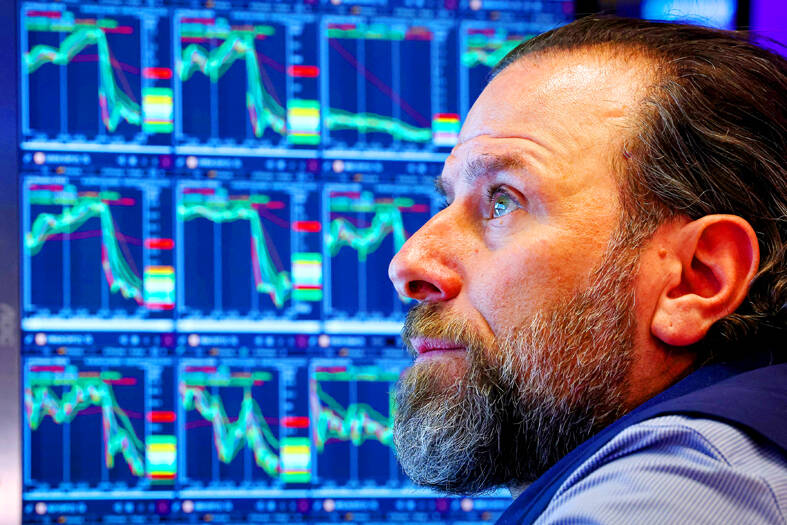Shares slid further yesterday after US President Donald Trump’s tariffs sent shudders through Wall Street at a level of shock unseen since the COVID-19 pandemic pummeled global markets in 2020.
Everything from crude oil to technology stocks to the value of the US dollar against other currencies has fallen. Even gold, a traditional safe haven that recently hit record highs, pulled lower after Trump announced his “Liberation Day” set of tariffs, which economists say carries the risk of a potentially toxic mix of weakening economic growth and higher inflation.
In early European trading, Germany’s DAX lost 0.7 percent to 21,568.78, while the CAC 40 in Paris slipped 0.7 percent to 7,547.19. London’s FTSE 100 gave up 0.6 percent to 8,426.10.

Photo: Reuters
Futures for the S&P 500 lost 0.4 percent, while those for the Dow Jones Industrial Average shed 0.5 percent.
The stock markets in Taiwan, Shanghai, Hong Kong and Indonesia were closed for holidays, limiting the scope of yesterday’s sell-offs in Asia.
Tokyo’s Nikkei 225 lost 2.8 percent to 33,780.58, while South Korea’s KOSPI sank 0.9 percent to 2,465.42.
In the two US allies who said they were focused on negotiating lower tariffs with Trump’s administration, Australia’s S&P/ASX 200 dropped 2.4 percent, closing at 7,667.80, while Bangkok’s SET fell 2.6 percent.
In other trading early yesterday, the US dollar fell to ¥145.87 from ¥146.06. The yen is often used as a refuge in uncertain times, while Trump’s policies are meant in part to weaken the US dollar to make goods made in the US more competitive overseas.
The euro edged lower to US$1.1054 from US$1.1055.
Trump announced a minimum tariff of 10 percent on global imports, with the tax rate running much higher on products from certain nations such as Taiwan, China and nations in the EU. Smaller, poorer nations in Asia were slapped with tariffs as high as 49 percent.
It is “plausible” the tariffs altogether, which would rival levels unseen in more than a century, could dent US economic growth by 2 percentage points this year and raise inflation close to 5 percent, UBS said.
Trump has previously said tariffs could cause “a little disturbance” in the economy and markets, and on Thursday he downplayed the impact.
“The markets are going to boom, the stock is going to boom and the country is going to boom,” Trump said as he left the White House to fly to Florida.
The S&P 500 sank 4.8 percent to 5,396.52 and the Dow Jones Industrial Average dropped 4 percent to 40,545.93. The NASDAQ composite tumbled 6 percent to 16,550.61.
Investors knew Trump was going to announce sweeping new tariffs and fears surrounding it had already pulled Wall Street’s main measure of health, the S&P 500 index, 10 percent below its all-time high.

MULTIFACETED: A task force has analyzed possible scenarios and created responses to assist domestic industries in dealing with US tariffs, the economics minister said The Executive Yuan is tomorrow to announce countermeasures to US President Donald Trump’s planned reciprocal tariffs, although the details of the plan would not be made public until Monday next week, Minister of Economic Affairs J.W. Kuo (郭智輝) said yesterday. The Cabinet established an economic and trade task force in November last year to deal with US trade and tariff related issues, Kuo told reporters outside the legislature in Taipei. The task force has been analyzing and evaluating all kinds of scenarios to identify suitable responses and determine how best to assist domestic industries in managing the effects of Trump’s tariffs, he

TIGHT-LIPPED: UMC said it had no merger plans at the moment, after Nikkei Asia reported that the firm and GlobalFoundries were considering restarting merger talks United Microelectronics Corp (UMC, 聯電), the world’s No. 4 contract chipmaker, yesterday launched a new US$5 billion 12-inch chip factory in Singapore as part of its latest effort to diversify its manufacturing footprint amid growing geopolitical risks. The new factory, adjacent to UMC’s existing Singapore fab in the Pasir Res Wafer Fab Park, is scheduled to enter volume production next year, utilizing mature 22-nanometer and 28-nanometer process technologies, UMC said in a statement. The company plans to invest US$5 billion during the first phase of the new fab, which would have an installed capacity of 30,000 12-inch wafers per month, it said. The

Taiwan’s official purchasing managers’ index (PMI) last month rose 0.2 percentage points to 54.2, in a second consecutive month of expansion, thanks to front-loading demand intended to avoid potential US tariff hikes, the Chung-Hua Institution for Economic Research (CIER, 中華經濟研究院) said yesterday. While short-term demand appeared robust, uncertainties rose due to US President Donald Trump’s unpredictable trade policy, CIER president Lien Hsien-ming (連賢明) told a news conference in Taipei. Taiwan’s economy this year would be characterized by high-level fluctuations and the volatility would be wilder than most expect, Lien said Demand for electronics, particularly semiconductors, continues to benefit from US technology giants’ effort

‘SWASTICAR’: Tesla CEO Elon Musk’s close association with Donald Trump has prompted opponents to brand him a ‘Nazi’ and resulted in a dramatic drop in sales Demonstrators descended on Tesla Inc dealerships across the US, and in Europe and Canada on Saturday to protest company chief Elon Musk, who has amassed extraordinary power as a top adviser to US President Donald Trump. Waving signs with messages such as “Musk is stealing our money” and “Reclaim our country,” the protests largely took place peacefully following fiery episodes of vandalism on Tesla vehicles, dealerships and other facilities in recent weeks that US officials have denounced as terrorism. Hundreds rallied on Saturday outside the Tesla dealership in Manhattan. Some blasted Musk, the world’s richest man, while others demanded the shuttering of his